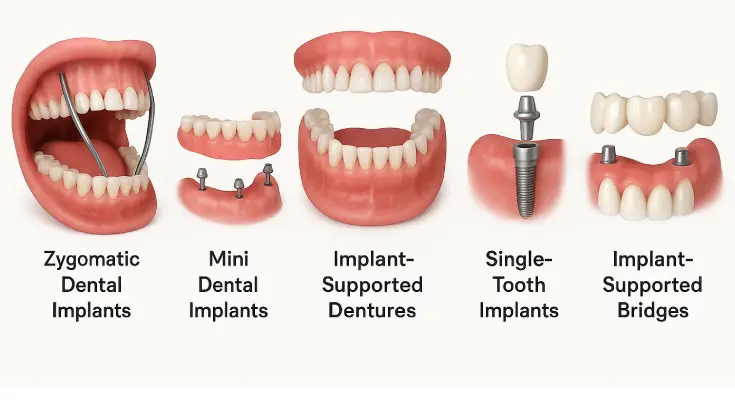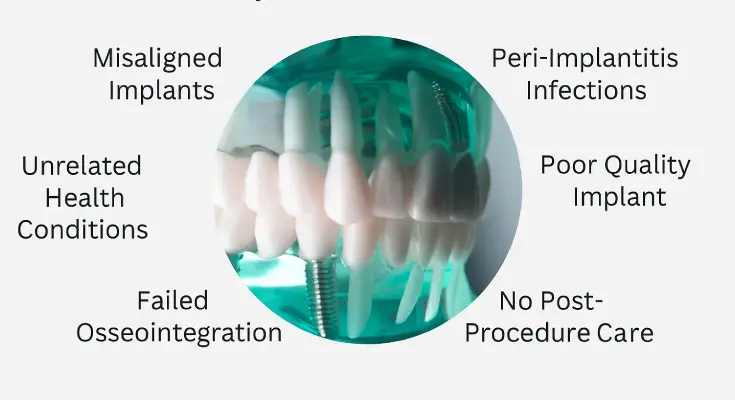Dental Implants for Seniors: NYC Success Rates & Age-Based Insights
Dental implants are becoming the leading solution to aesthetically and functionally replacing missing teeth. They have been proven to be suitable for qualifying elderly people. People wonder whether dental implants for seniors are a better solution than dentures. At 65 Broadway Dental, we believe that dental implants can improve life, even for seniors.
Knowing what the process is helps seniors prepare for this cosmetic dentistry procedure. Read on to understand what to expect if considering this for a parent or grandparent in NYC.
What are Dental Implants?
Dental implants are artificial teeth that mimic the appearance and function of real teeth. This option comes as close as possible to real teeth, when considering appearance and comfort. An implant is made of different pieces (implant, abutment, and crown) and materials.
The implant, or lowermost part, acts as a root, giving the implant support. This metal is firmly fixed in the patient’s jawbone.
The abutment, or middle-piece, acts as a connector, allowing the other two pieces to connect. It’s also made out of metal and fits onto the implant.
The crown, or outermost implant piece, acts as the replacement for a tooth. It’s made of various materials that can mimic the appearance of human teeth.
Are Dental Implants Advisable for Seniors?
There’s no reason for seniors to be denied dental implants based on age alone! If they fit the remaining criteria boxes, there’s no reason why they can’t get them.
Dental implants can solve food restrictions caused by missing teeth, shifting, or loose dentures. Naturally, there is concern about the safety of dental implants for seniors.
Another factor seniors should consider is how tooth decay accelerates with age, especially after 60. Learn why tooth decay accelerates after 60
The good news is that high success rates aren’t just tied to age. The qualities that matter most for successful dental implants in older patients are:
- Overall health and healing ability
- Presence of enough jawbone for implant support
- Ability to follow up with dental specialists afterwards
Willingness to commit to dental implant care and general oral hygiene
Naturally, there is concern about the safety of dental implants for seniors. Another common question seniors and families ask is whether insurance covers dental implants in NYC. Understanding both eligibility and affordability helps in making a confident decision.
Insights - Success Rates of Dental Implants in Seniors
Success rates of dental implants in New York City may be highest among middle-aged individuals, but seniors aren’t far behind.
In research published by the NIH on dental implants in the elderly, there was a 92.9% success rate in patients 60+. This shows dental implants can be successful in the older population as well.
Age alone isn’t the deciding factor, as qualities like bone density and overall health also matter.

Which Is Better for Seniors: Implants or Dentures?
Dentures are affordable, but implants are steady and long-lasting. This comparison often confuses senior patients, as it’s not an easy choice.
Many factors influence the decision between the two dental procedures. Influencing factors are bone density, overall health, healing ability, cost, and oral health.
Personally, the 65 Broadway Dental team suggests getting dental implants if you qualify. There’s no denying what a difference a fixed dental appliance can make to seniors.
Not only does it repair facial structure, but it also restores most abilities. Seniors regain their ability to chew, speak, and smile just as before, with implants. All these abilities will enhance the quality of life for seniors, irrespective of age.
Dentures vs Dental Implants for Seniors: Comparison Table
| Feature | Dental Implants | Dentures |
|---|---|---|
| Appearance | Look natural | Appear very artificial |
| Longevity | Can last decades | Needs replacing in 5 to 8 years |
| Usability | Patient gets full abilities | Deliver limited abilities |
| Maintenance | Routine oral care (brushing, flossing, checkups) is enough | Need daily cleaning and occasional adjustments |
| Comfort | Feel comfortable, like real teeth | Uncomfortable, feel like fake teeth |
| Bone Preservation | Protects against bone loss | Can contribute to bone loss |
| Stability | Secured to the jawbone | Unstable, can shift or loosen |
| Surgery | Requires surgery | No surgery |
| Cost | High costing | Affordable |
What are the Alternative Options to Dental Implants?
There are non-invasive and invasive alternatives to dental implants. Dentures are a surgery-free choice, while implant-supported bridges are a costly surgical option.
Closing the debate between implant-supported bridges vs dentures requires careful research. While most elderly people use dentures, they appear less effective, unappealing, and uncomfortable.
To help you decide, here are some scenarios to help you pick correctly:
- Select implant-supported bridges if you need a stable, permanent solution and have enough jawbone.
- Choose dentures for an affordable, removable, and surgery-free option.
What are the Lasting Benefits of Dental Implants for Seniors?
Dental implants for seniors provide benefits that contribute to their well-being. Addressing oral problems is critical because dental health affects overall health. The lasting health benefits for senior patients that can be linked to implants are:
Identical Appearance to Real Teeth:
Aged people who feel conscious about their teeth’s appearance would be attracted to dental implants. They look just like the real ones and not tacky artificial pieces used to fill the gaps.
Jawbone Preservation
Unlike other alternatives, these dental implants are a positive action for bone preservation. These implants stimulate the jawbone to stop the bone loss that occurs after tooth loss.
Restores Facial Structuring
Dental implants also deliver a unique quality in helping restore the facial appearance. They fill the lower face area and help reverse the sunken patches around the mouth.
Improves Chewing, Expanding Diet
The presence of a full set of teeth helps aging people chew normally again. As a result, they can expand their diet, receive more nutrition, and improve their health.
Long-Lasting
When comparing dental implants to dentures, implants outlive dentures. This dental option is permanent and long-lasting, lasting for decades with the right care.
Brings Back Confidence & Social Life
Support and comfort provided by dental implants will put a smile back on the faces of seniors. This gives them the confidence to restart social activities and be around people again.
What are the Concerns About Dental Implants for Seniors?
Of course, the words “dental implants” may be alarming to some elderly patients. But there’s nothing to be afraid of. Here are some concerns and why they aren’t to be feared.
Pre-Existing Health Conditions
There are concerns about having a health condition making you ineligible for dental implants. Add age to this factor, and many elderly patients feel they can’t have the procedure.
This is untrue, as dentists say patients need to keep diseases under control. If you have well-managed diabetes, heart conditions, or osteoporosis, you can get dental implants
Jaw Bone Loss
Severe bone loss can make it difficult to have dental implants. However, it’s not a factor that eliminates your chances! Elderly people experience some bone loss due to the daily wear and tear with age.
Dentists take bone density images before the procedure. If there is more bone loss than expected, procedures like a bone graft can help.
Surgical Procedure
The fact that getting dental implants requires surgery may scare older patients. However, it’s a safe procedure where patients are given anesthesia to minimize discomfort.
Many senior patients who’ve had dental implants with us have been impressed by the minimal pain and quick healing.
Am I too Old?
A thought that crosses a senior’s mind when considering implants is, “Am I too old now?” The truth is, no one exceeds the age limit for implants if you’re in good health.
Considering dental implants for seniors is worthwhile for anyone over 60 with missing teeth. It’s not too late to improve your quality of life. Growing older isn’t a reason to accept losing the ability to eat, speak, or smile!
What are the Dental Implant Options Available for Seniors?
Options exist under the category of dental implants, so here are the ones to consider.

1. Zygomatic Dental Implants
Dental implants are placed in the jawbone (endosteal implants) or above it (subperiosteal implants). But problems arise when patients lack enough upper bone.
The solution for this is to use the cheekbone as a placement site. These implants, known as zygomatic dental implants, have firm support from the cheekbone.
2. Mini Dental Implants
Mini dental implants differ from traditional implants in their size and structure. The regular ones measure 3.5 mm to 6 mm and have a two-part implant system. Mini dental implant benefits include a smaller 3 mm size and a one-part implant system.
3. Implant-Supported Dentures
These fixed dentures are a solution for users who find traditional dentures ineffective. It’s suitable for elderly patients who have lost most of the teeth in an arch.
Here, the dental appliance is fixed in the mouth using implants, which are metal insertions. This offers more stability and comfort, which removable dentures don’t provide.
Our blog on Implant-supported bridges vs Dentures will help you make a decision if you’re torn between the two options.
4. Implant-Supported Bridges
These bridges rely on filling tooth gaps with artificial teeth held in place by surrounding teeth. It gives minimal support, and healthy surrounding teeth must undergo permanent changes.
Another choice is implant-supported bridges, which draw support from the jawbone. The dentist places false metal roots in the bone to support the teeth. This means the teeth surrounding the missing gap don’t need to change.
Are these implant-supported bridges really better than dentures? You can find out in our elaborate guide on Implant-supported bridges vs dentures.
5. Single-Tooth Implants
Single-tooth dental implants for seniors are the best option to close single-tooth gaps. Having a front tooth, incisor, or molar fall out is far from ideal. It can affect your smile, chewing, or biting ability.
Filling these select gaps one at a time is possible with single-tooth implants. It’s a cost-efficient solution that doesn’t need a large upfront payment.
What Factors Influence Implant Options for Seniors?
Being able to get dental implants in old age isn’t about age. In fact, besides age, these four factors are just as important:
- Bone Density
The higher the bone density, the better. Patients with lower bone density can always opt for a bone graft if possible. Poor jawbone density may require dentists to consider the cheekbone for upper arch implantation. - General Health
Older patients in good overall health have more dental implant options available to them. Having health conditions that aren’t under control can affect your eligibility for implant procedures. - Number & Location of Missing Teeth
Loss of many teeth may mean full-arch implants are the most suitable option for you. Losing most upper teeth and poor jawbone density make you a candidate for Zygomatic implants. - Budget and Long-Term Goals
Limited money may make Oral Surgery for tooth extraction seem unaffordable, let alone dental implants. Call your local dentist to discuss your situation and options. Most dental practices offer terms, and some can offer discounts on dental implants for seniors.
What Complications Lead to Dental Implant Failure in Seniors?
Though the percentage of implant failure is low, it’s not impossible. This should give you an idea of why this happens.

- Misaligned Implants
Poor measuring before procedures can result in the final implant and fixtures not aligning properly. This issue is costly and painful for patients who must correct it due to failure. - Peri-Implantitis Infections
The most common infection among dental implants is peri-implantitis. Its two forms affect the gums surrounding dental implants. - Poor Quality Implant
Implants use materials that can withstand decades of use. Some dentists cut corners and use materials that are easily damaged, even with care. Low-grade materials can be, but rarely are, the cause of implant failure. - Lack of Post-Procedure Care
Ignoring the dentist’s post-care tips can lead to significant issues later, even implant failure! Seniors who’ve had the procedure must follow care and maintenance efforts to avoid complications. - Failed Implant-Jawbone Fusion
A sign of successful dental implants is the fusion of the jawbone with the implants. This process is called osseointegration, and when it doesn’t happen, it means something is wrong. - Unrelated Health Conditions
Underlying health conditions like diabetes and heart conditions can lead to difficult post-implant recovery. Poor control of these health issues can reduce the healing and lead to implant failure.
Conclusion
65 Broadway Dental has watched dental implants for seniors give countless elderly patients a new lease of life!
These artificial teeth match the appearance and ability of real teeth, restoring confidence. If you’re worried about age, don’t be, because good health and jawbone density matter more. Dental implants provide a stable and permanent solution to teeth lost due to age.
FAQs
1. Will Medicare pay for dental implants for seniors in NYC?
Some health insurance plans do offer some coverage, but full coverage is rare.
2. Is it worth getting implants at 70 years old?
Absolutely, if you have lost the ability to eat, smile, and speak normally due to tooth loss.
3. What are mini dental implants?
Mini dental implants are the smaller and more compact version of dental implants. They are suitable when patients lack jawbone density but want to avoid bone grafting.
4. Is there a cheaper alternative to dental implants?
Although dentures are an affordable alternative, they aren’t always the better option. Seniors wearing dentures complain about a lack of support, causing shifting.
5. How long do dental implants typically last?
Dental implants last for decades, and with the right care and maintenance, a lifetime!

Dr. Alexander Heifitz (Author)
Dr. Alexander Heifitz is the founder of 65 Broadway Dental in NYC, where he combines advanced dental expertise with a patient-first approach. He specializes in cosmetic and restorative treatments such as dental implants, veneers, Invisalign, and smile makeovers, helping New Yorkers achieve both oral health and confidence.
Booking An Appointment
Looking for a reliable dentist in Downtown NYC? Whether you need a routine cleaning, urgent care, or a full smile transformation — we’ve got you covered. We accept most PPO insurance plans and offer flexible scheduling.
+1 (212) 430-3888
Call for appointment
Walk-ins Welcome / Same-Day Appointments Available

Related Blogs

Does an Apple Clean Your Teeth? Easy Answer for Kids & Adults
Can eating an apple really clean your teeth? Crunchy bites help freshen your mouth, but apples aren’t a substitute for brushing and flossing.
Read More
The Best Way to Whiten Your Teeth: Proven Methods That Actually Work
Discover the best ways to whiten your teeth safely. Learn proven methods, dentist-recommended treatments, and tips to get a brighter, long-lasting smile.
Read More